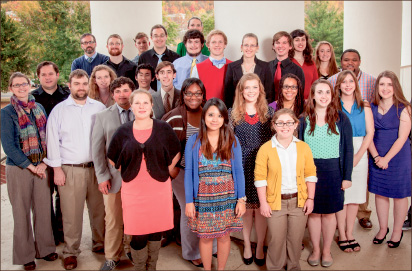Personal perspective: Team feels like family

Debate welcomes students from every major who are looking to work hard and take on a new challenge

CHALLENGE — The debate team encourages one another during preparations and tournaments. Photo provided
The glowing numbers of the digital clock read 2 a.m. That means four hours of sleep. But more work is waiting.
This is an average tournament night for the Liberty University debate team — the most elite academic institution on campus.
For people seeking an intellectual challenge, there is no greater opportunity a school can offer than to join a debate program. It provides access to knowledge and experience that other classes cannot offer.
A policy debate emphasizes research, integration and assimilation of information, and speaking quickly, according to Liberty’s debate page, and in college, a policy debate is nothing like presidential debates seen on TV. Nor do debaters simply argue for ideas with which they agree. Unmotivated, and undisciplined students do not make good debaters.
“If you’re thinking about debate, take everything that you’ve ever seen, read or heard about that wasn’t an actual debate round and throw it out the window because it is not what you expect,” Mary Bobbitt, a varsity debater, said. “It is difficult to understand from an outsider’s perspective.”
Quick, critical thinking and being able to handle pressure are only a couple of the characteristics needed to achieve success in debates.
“Two things it seems like all successful debaters have are … a certain level of natural intelligence … and a way of thinking,” Michael Hall, Liberty University director of debate, said. “(S)omeone who has a strong analytic intelligence … tends to do well in debate. The second element is someone who’s a high achiever.”
Debate is diverse. Students from numerous majors, ranging from government to elementary education, join the program. It paves the way for those wanting to attend law school or obtain other graduate degrees by teaching students to manage time and juggle large workloads.
“I don’t think there’s any relationship between a degree program that you choose and how well you can do with debate,” Hall said.
Such diversity creates a place where the students become like a family. The nature of debate forces them to spend time with each other, and from that stems sibling-like relationships.
Both Hall and Bobbitt see the family atmosphere as a positive aspect of the debate community. Yes, members sometimes argue or fail to see eye to eye, but that is part of family. Hall and Bobbitt also agree that they met some of their closest friends through debate.
However, close friendships are not only formed among Liberty debaters. They build strong connections with students from other schools as well.
Debaters are exposed to stress that comes from balancing classwork, debate work and travel. On top of the stress is piled a general lack of sleep, especially during tournaments.
Tournaments typically consist of three 12-hour days, which are both physically and mentally exhausting, Hall said. Switching back to regular classes, then, is not always easy.
“The toughest part is definitely losing the weekends and the long nights and the work hours. We essentially work a 40-to-60-hour-week job with no weekends off,” Bobbitt said. “Sure, it’s difficult, but that difficulty pushes you … in ways where you either crack, or you become a better person.”
As a result, debate allows a person to “cut through the noise of an argument and quickly identify the central issue,” Hall said. Furthermore, research skills are developed, which bolsters learning in other academic areas, according to Hall.
Debaters work in pairs and compete against other partnerships in front of one judge who determines the winner.
“Some people … really think we stand in auditoriums on podiums and (that) we talk to an audience,” Bobbitt said. “We’re in classrooms having literal Rubbermaid tubs (for lectures) that we’re speaking off of, speaking very quickly in front of one person. It is so much harder than what’s expected.”
A debate is very structured — from its speech organization to the individual arguments within each speech.
“I love the structure of it and seeing how the arguments flow,” Emily McCarty, a novice debater, said. She discovered that flow of thought is also useful in her major, philosophy.
McCarty found a niche on the team after asking God where he would have her fit. Being able to compare Christianity with competing worldviews is a practical application of critical thinking outside of debate, she said.
“As a believer, I think critical thinking is so important in your relationship with the Lord,” McCarty said.
Debate will leave its mark. As a previous debater, I know this to be true. When asked how she benefitted from debate, Bobbitt immediately said, “In every way. I would not be the person I am today without debate.”
